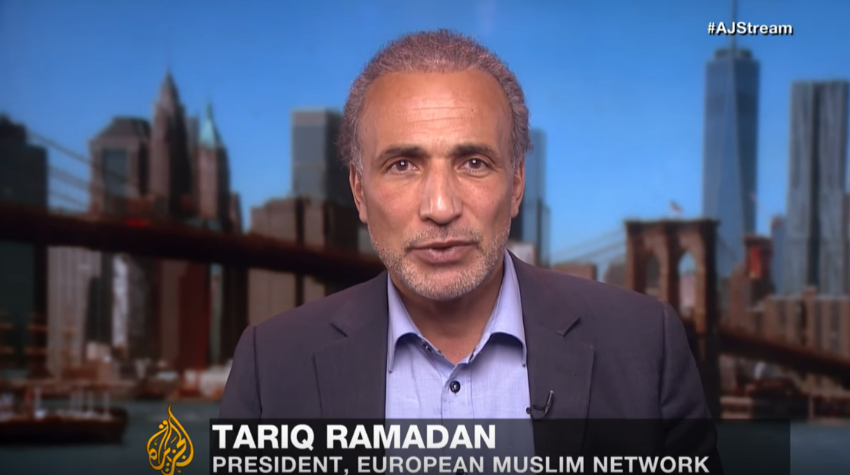Tariq Ramadan’s The Messenger goes beyond stereotypes for a glimpse of the real-life prophet Muhammad, says Naseem Khan
Naseem Khan
Saturday May 26, 2007
Guardian
The Messenger: The Meanings of the Life of Muhammad
by Tariq Ramadan
256pp, Allen Lane, £20
Six months or so after 9/11, I was in Texas and walked into a good-sized bookshop to find myself face to face with something quite unexpected. There, piled on a table directly opposite the door, was a huge stack of books and all of them were about Islam.
9/11 may not have achieved anything positive, but at least it has galvanised the west’s curiosity about that most misunderstood and demonised religion. Tariq Ramadan’s The Messenger: The Meanings of the Life of Muhammad sits in this context and will doubtless – despite the embargo on its author entering the States – also soon be piled up high in western bookshops. It will also doubtless be scanned with the same kind of anxious agenda so clearly visible in Texas. You can hear readers ask: Who are these people? What is jihad? Are Muslims really wild-eyed fanatics out to destroy us? This book will not give them reassurance, but it will give them a measure of insight.
Ramadan has set himself the task of extracting the Prophet from the cement of blind devotion. To do this, he traces the Prophet’s life not so much through the biographical facts (the book is rather confusing on these, with a host of bit players coming and going) but by quarrying events to see how they illuminate the Prophet and his teachings. It is a careful endeavour, drawn with thoroughness from the hadith (or contemporary memories recorded by the Prophet’s Companions) and the Qur’an itself. There are flashes of intimacy. Muhammad’s wife Ayesha mentions the way he used to mend his own clothes; on the road to yet another battle, he sees a litter of newborn puppies and stops to see that they are safely removed from the path of his army. When his only son dies, his Companions reprove him for not following his own teachings that proscribed excessive grief.
At times it does seem dangerously close to a counsel for the defence, as Ramadan draws together incident after incident, report after report, that bear witness to the Prophet’s gentleness and tenderness. They show him sparing the poor and respecting women’s strengths, revering nature and adhering to the terms of military pacts even when they were not in his favour. This is not the intolerant bigot who features so strongly in popular mythology. It is a counter to the stereotype – and a relief, for I have always found the myth at odds with the ethical integrity I see in my own relatives. And it should give Texans and others pause for thought.
Inevitably, there are times when Ramadan tries to squeeze small events too hard for lessons. And he is rather too subtle and coded for my taste when it comes to the light that can be thrown on contemporary Muslim issues. The fact that Muhammad prescribed the veil for his wives alone and not as a general edict is recorded, but its implications are not drawn out; and the regular notes about forthright women who were active in public life leave readers to draw their own conclusions. Jihad is defined firmly as an internal struggle. While qital (armed resistance against oppression) is identified as a second form of jihad, both – argues Ramadan – “are the ways that, by resisting the dark temptations of the inner self as well as human beings’ proclivity for war, will make it possible to reach peace”.
The hijrah – when the Prophet and his beleaguered followers decamped from Mecca to Medina – demonstrates the need to change one’s ways with a change of geography. “It was a difficult experience [for those] who might have been tempted to think that their habits and customs were in themselves Islamic; hijrah, exile, was to reveal that this was not the case and that one must question every single cultural practice, both to be faithful to Islamic principles and to open up to other cultures and gain from their wealth.” When the Prophet heard of a wedding among the Medina Muslims, he sent two singing maids to the event, showing he not only recognised a taste “that was not itself opposed to Islamic principles but he integrated it as enrichment of his own human experience”. Flexibility and tolerance, he implies, are Islamic.
These are useful nudges and should contribute to debate. But where Ramadan really comes into his own is in passages that deal with the experience of direct revelation. It is very hard to write about faith in this country: it tends to make people uneasy. But from time to time, The Messenger manages to communicate a sense of spiritual transcendence. “The heart cannot but commune with such a being as he follows the path to freedom,” states Ramadan, and he convinces. For while critical intelligence is vital, it is not enough. To gain some understanding of, and empathy with, Islam, insight is needed into that difficult, heightened and private area of faith.
Source : The Guardian



![PALEXPO : Democratic Engagement & Justice for Palestinians [08/07/2017]](https://tariqramadan.com/english/wp-content/uploads/sites/9/2017/07/Palexpo.png)
![Bristol Festival of Ideas : Conversation with Julian Baggini [24/05/2017]](https://tariqramadan.com/english/wp-content/uploads/sites/9/2017/06/bristol.png)
![Interview on BBC Radio Ulster [06/06/2017]](https://tariqramadan.com/english/wp-content/uploads/sites/9/2017/06/p03nnqlv.jpg)
![Interview on BBC 4 : What do the London attacks have to do with Islam? What is the Muslims’ responsibility?[06/06/2017]](https://tariqramadan.com/english/wp-content/uploads/sites/9/2017/06/bbc.jpg)

